One in three new mothers during early COVID-19 screened positive for postpartum depression, a new study shows.
That’s nearly triple pre-pandemic levels.

One in three new mothers during early COVID-19 screened positive for postpartum depression, a new study shows.
That’s nearly triple pre-pandemic levels.
